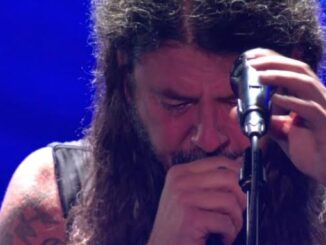
London, England In a night bursting with sound, sweat, and raw emotion, the Foo Fighters stormed the iconic O2 Arena with a performance that will be remembered for years to come. It wasn’t just a concert it was a statement. A roaring, defiant message that rock is not only alive but thriving, and that Foo Fighters are still its beating heart.
The June 20th show marked a long-anticipated comeback, and from the moment the lights dropped, the band held nothing back. Launching into their blistering anthem “All My Life,” the arena erupted in waves of excitement as fans, both longtime loyalists and new believers, were swept into the band’s powerful energy. Frontman Dave Grohl, commanding the stage with his trademark ferocity, delivered a performance that felt like both a revival and a revolution.
The road to this moment has not been easy. The tragic passing of beloved drummer Taylor Hawkins in 2022 left a gaping hole in the band’s spirit. Many wondered whether the Foo Fighters could or even should continue without him. But the release of their emotionally charged album But Here We Are in 2023 marked a turning point. A raw and honest tribute to loss and healing, it served as a bridge between grief and growth.
That spirit echoed powerfully at the O2. Grohl, at times visibly moved, poured heart and soul into every note. The new drummer, taking up Hawkins’ spot with a mix of reverence and passion, didn’t try to replace him instead, he honored the legacy by propelling the band forward with unshakable force.
The night’s setlist was a masterclass in rock legacy. Fan favorites like “The Pretender,” “Best of You,” and “My Hero” were met with deafening singalongs, while newer tracks such as “Rescue Me” and “Under You” stood tall, proving that the band is not resting on past glories. Instead, they’re forging a new chapter with confidence.
The highlight of the night came during “Times Like These,” when Grohl slowed down the intro to near silence before unleashing its emotional crescendo. The audience, holding up phone lights in tribute, created a galaxy of remembrance an unspoken acknowledgment of Hawkins’ enduring presence.
The audience was more than just a crowd it was a community. People from across the UK and beyond gathered to witness what many described as a “once-in-a-lifetime” experience. Strangers embraced, tears were shed, and chants of “Foo! Foo! Foo!” shook the rafters long after the final encore.
One fan said, “I’ve been to a lot of gigs, but nothing like this. It wasn’t just a concert it was therapy, it was joy, it was power. You could feel the love in every chord.”
In an era dominated by auto-tune and algorithm-driven hits, the Foo Fighters’ performance was a reminder of the irreplaceable force of real instruments, real voices, and real stories. The band didn’t rely on spectacle alone though the pyrotechnics were dazzling they relied on authenticity, musicianship, and a fearless vulnerability that connected deeply with the crowd.
The O2 show wasn’t just a return to form it was a reinvention. The Foo Fighters stood as living proof that rock doesn’t need to evolve by abandoning its roots. Instead, it evolves by digging deeper, playing louder, and daring to feel more.
As the final notes of “Everlong” faded into the night, Grohl stood center stage, soaking in the cheers with a look of humble defiance. “We’re not going anywhere,” he shouted. And in that moment, it was clear: the Foo Fighters are not just surviving they are thriving, igniting a new era of rock with every beat.
Their O2 comeback was not merely a show; it was a historic moment in modern music a declaration that even after darkness, the fire still burns. Foo Fighters have returned not as relics of the past, but as vanguards of rock’s.





Be the first to comment